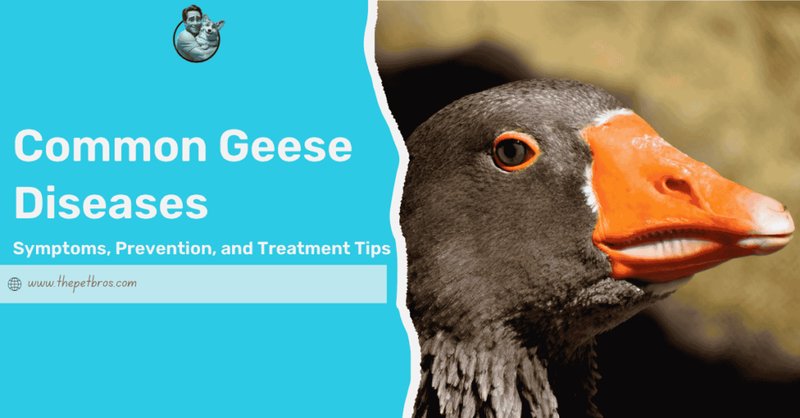
Caring for geese isn’t just about feeding them. It’s like being a good parent or a meticulous coach—you’re looking out for their well-being every step of the way. Think of it like maintaining a car: Regular check-ups and preventative measures can save you a lot of trouble in the long run. In this article, we’ll dive into some common health issues geese face, how to spot them, and, most importantly, how to prevent them from happening in the first place.
Common Goose Health Problems
Geese can run into various health issues, which can stem from their environment, diet, or infectious agents. Here are a few of the most common problems you might encounter:
1. Respiratory Issues
Respiratory problems in geese often manifest as coughing, sneezing, or nasal discharge. These symptoms can be caused by poor air quality, bacterial infections, or even viruses. Imagine living in a dusty room with no ventilation; it wouldn’t take long before you started to sneeze, right?
Geese are particularly susceptible to respiratory issues if they’re kept in overcrowded conditions or exposed to moldy feed. A common infection known as *avian bronchitis* can also affect them. To help prevent these issues, ensure they have plenty of fresh air and avoid housing them in damp, dark environments.
2. Foot and Leg Problems
Geese are known for their strong feet, but they can still encounter various foot and leg conditions. Issues like bumblefoot, which is an infection caused by bacteria entering through cracks in the foot pads, can lead to swelling and lameness. Think of it as a blister that gets worse if not treated.
To prevent foot problems, keep their living area clean and provide them with soft bedding. Regularly check their feet for signs of injury or infection, just like you would keep an eye on your own feet after a long walk.
3. Digestive Disorders
Just like us, geese can have tummy troubles. Their digestive systems are sensitive, and problems can arise if they eat moldy or spoiled food. Signs to watch for include a lack of appetite, diarrhea, or bloating. These issues can lead to more severe conditions if not addressed quickly.
One way to prevent digestive disorders is to provide a balanced diet that includes plenty of greens, grains, and clean water. Make sure to avoid sudden changes in their diet to keep their digestive systems happy and healthy.
4. Feather Loss and Skin Issues
Feather plucking and skin problems can be another area of concern for geese. This might seem like a cosmetic issue, but it can be a sign of stress, nutritional deficiencies, or parasites. Imagine if you were stressed and started pulling at your hair—geese can act in a similar way.
To combat feather loss, ensure they have adequate space, a balanced diet, and regular checks for pests like mites or lice. Providing them with opportunities to bathe and preen will also help maintain healthy feathers.
5. Parasite Infestations
Just like other animals, geese can suffer from internal and external parasites. Common culprits include worms and mites. These pests can lead to weight loss, lethargy, and other health problems. It’s like having an uninvited guest—nobody wants that!
Preventing parasite infestations requires regular deworming and good sanitation practices in their living area. Keeping their environment clean and regularly checking for signs of parasites will help keep those unwanted guests away.
Preventative Measures for Goose Health
Now that we’ve talked about some common health problems, let’s explore ways to prevent them. Prevention is key, and there are several proactive steps you can take to keep your geese healthy.
1. Regular Health Checks
Just like you’d visit the doctor for routine check-ups, geese benefit from regular health assessments. This can involve checking their weight, examining their feathers, and keeping an eye on their behavior. If you notice anything out of the ordinary, don’t hesitate to consult a vet.
Regular checks not only help in spotting potential issues early but also reinforce your bond with your geese, making them feel more comfortable in your presence.
2. Balanced Diet
Feeding geese a well-rounded diet is crucial for their overall health. Offer a mix of grains, greens, and commercial poultry feed designed for their specific needs. It’s like making sure your plate has all the food groups; variety is essential!
Make sure their food is fresh and free from mold. And remember, water is just as important—always provide clean drinking water, as dehydration can lead to numerous health issues.
3. Clean Environment
Keeping their living area clean is one of the simplest yet most effective ways to prevent health problems. Regularly remove waste, provide fresh bedding, and ensure proper ventilation. It’s like brushing your teeth: a little daily care goes a long way toward preventing bigger issues.
A clean environment can significantly reduce the risk of respiratory problems and parasites and will also keep your geese feeling happy and comfortable.
4. Social Interaction
Geese are social creatures and thrive on interaction. Isolating them can lead to stress, which might manifest as feather plucking or other health problems. Make sure they have plenty of space to roam and encourage positive interactions with other geese or animals.
Think of it like a party—everyone has a better time when they can mingle!
Understanding common goose health problems and their prevention is essential for anyone who cares for these charming birds. Keeping an eye out for signs of distress, providing a balanced diet, maintaining a clean living space, and regularly checking in on their health can make a significant difference in their lives.
By investing the time and effort into their care, you’re not only helping them thrive but also ensuring they bring joy and companionship to your life. So grab your checklist, and let’s keep those geese happy and healthy!

